These Los Angeles-based lawyers renovated a 16th-century Tuscan farmhouse into a luxury villa. Here’s how they did it
Stephen Lewis and Christian Scali met the old-fashioned way, as Scali likes to call it: at a Starbucks in Los Angeles’ West Hollywood neighborhood.
It was spring of 1997, and Scali, a law student, was buried deep in his textbooks. Lewis, who at the time was in private practice, was reading The New York Times — but, apparently, also keeping an eye on a fellow customer.
“I was studying, he recognized the books, he came up to me smiling,” Scali says. “I was smitten by him.”
The rest, as they say, is history: The couple started dating, eventually moved in together, and in August 2023 celebrated their 15th wedding anniversary.
They’re now embarking on an exciting new chapter of their lives as owners of a 16th-century farmhouse in Italy’s famed Tuscany region, which they purchased in 2021 and have since renovated into a luxury, eight-bedroom villa that opened for guests this summer. The villa is available as a full-property rental, but Scali and Lewis also spend time there when they’re in Italy — and eventually plan to live there full-time in retirement.
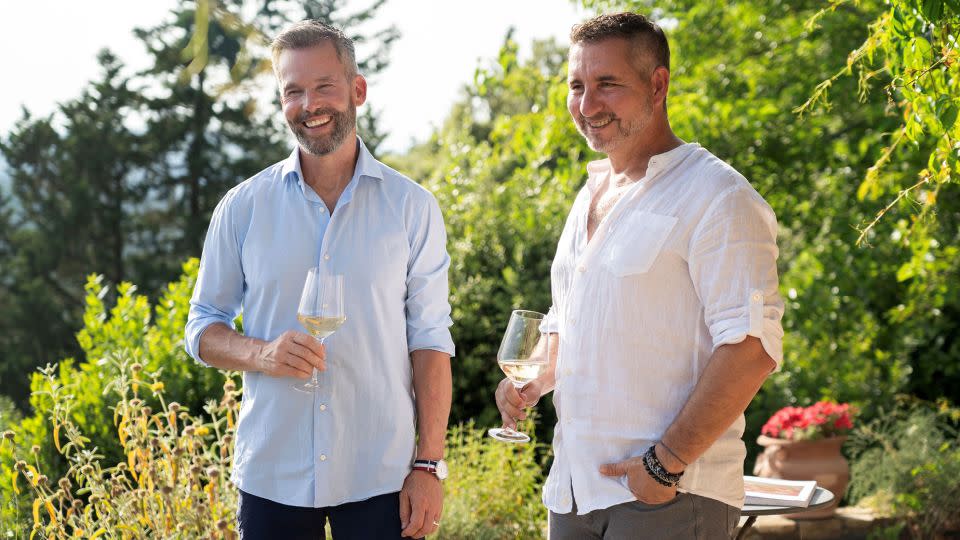
‘What if we lived in the countryside?’
For Scali, whose grandfather is originally from Reggio Calabria in Italy, the idea to buy a property in his family’s homeland had been percolating for a while. He grew up in the Cleveland suburbs, surrounded by a large Italian family — “my grandparents had eight kids, and I have like 50 cousins,” he says — that gathered on Sundays for meals cooked by his grandmother.
“She had her own garden, and she made her own sauce,” he says. “All the kids would come over. It was a lot of fun.”
But after relocating to the West Coast, Scali, who had just one cousin living nearby, found himself longing for those boisterous family gatherings of his childhood. “Having grown up in that, I missed it later in life when I moved away,” he says.
Around 2016, he began taking Italian classes to improve the four years of courses he’d had in college. He and Lewis also had begun traveling regularly to Italy, mostly to the Tuscany area. Their trips began to plant seeds about owning a property and eventually retiring there — though Lewis took a bit longer to come fully on board with the idea.
“It was really Chris’ dream — I would have been content to rent,” he says. “But I was supportive because it was something that seemed really important to Chris. But as we started to look at places, I became quite excited about it myself.”
The couple started scanning online listings (“a friend called it my real estate porn,” Scali says) and began actively searching for properties in 2019, concentrating on Florence. But they soon discovered that, even with a sizable budget between $1.5 and $2 million, what they were looking for — an apartment big enough to host visiting family and friends, as well as large gatherings similar to those joyful Sunday dinners at Scali’s grandparents’ home — was far beyond reach in town.
“So we started shifting our idea: Well, what if we lived in the countryside? What if we lived in the Chianti [region]?” Scali says.
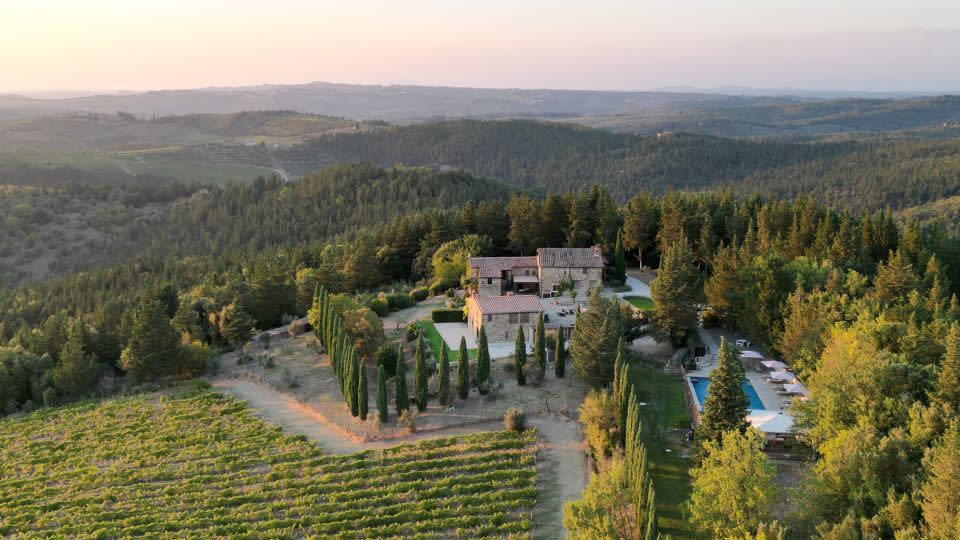
They refocused their search to that part of Italy, known for its beautiful towns, ancient castles, and vineyards producing some of the world’s most revered wines. But in early 2020, the pandemic put a dent in their plans, since Lewis — who was not an Italian citizen — wasn’t allowed to enter the country to join Scali, who in 2019 was granted citizenship through his family.
However, Scali obtained permission through the Italian consulate to bring Lewis over, and in the spring of 2021, they embarked on a six-week mission to find their “dream” place. They also reevaluated their vision for their future property and decided they would rent it out – meaning they’d also be making a new foray into the hospitality industry: as owners, not just guests.
‘A really stunning view’
After touring nearly 30 properties, they found one that seemed promising: a multi-bedroom estate with a pool, guesthouse and on-site vineyard. But there were several major concerns, including the awkward layout of the house, the sheer size of the property and an unpermitted guesthouse.
Then the couple heard about another property for sale: a 16th-century stone farmhouse, which once served as a lookout post to defend the valley between Siena and Florence, on an approximately 1.2-acre lot that also had a pool and standalone guesthouse. Perched off a winding road on a hillside about 45 minutes outside of Florence, the property, previously known as Antico Podere Marciano, had been a rustic, family-run bed-and-breakfast.
“We immediately fell in love with this house,” Scali recalls. “You look out and you see all the vineyards, you see all that hillside dotted with castles and towers and stone houses, and off in the distance, you see the towers of San Gimignano [a small medieval town nearby]. So it’s just a really stunning view.”
With a $1.95 million asking price, the property was just within their budget. And at the same time, negotiations with the other property had hit a snag related to the unpermitted guesthouse, which would have to be demolished in order for a sale to go through.
Adds Scali: “So we said, thank you, but no thank you.”
After discontinuing negotiations, they turned their efforts to the farmhouse property, negotiating a final price of $1.7 million. Closing took about six months: an incredibly long timeframe compared to the weeks-long window they were used to in California, but fairly quick in Italy, Scali says.
‘Keep the original Tuscan charm’
After receiving the keys, Scali and Lewis renamed the property Villa Ardore, which has a layered significance, Scali explains. “Ardore represents the Italian word for ardor, which generally means loving passion, and Ardore is the name of the small town my grandfather Scali’s family came from in Reggio Calabria. It has a special meaning for us because it captures both our family history and our feeling for the place.”
Excited as they were, the couple also felt overwhelmed by the sheer scope of work to be done: a property-wide upgrade for the electrical and plumbing; gutting the kitchen and bathrooms in the main building; rebuilding the pool; adding air conditioning throughout; and upgrading to a high-speed, meshed internet system with satellite. In addition, they transformed a former barn into a private spa: an indulgent oasis featuring a 10-person whirlpool, lounging beds, dry sauna and Turkish steam bath.
Indeed, the price tag for those extensive, high-end renovations — approximately $2.5 million — far exceeds that of many hopeful property owners in Italy, such as the popular one euro home schemes that a number of small villages across the country have launched in recent years in an effort to reinvigorate the local economy.
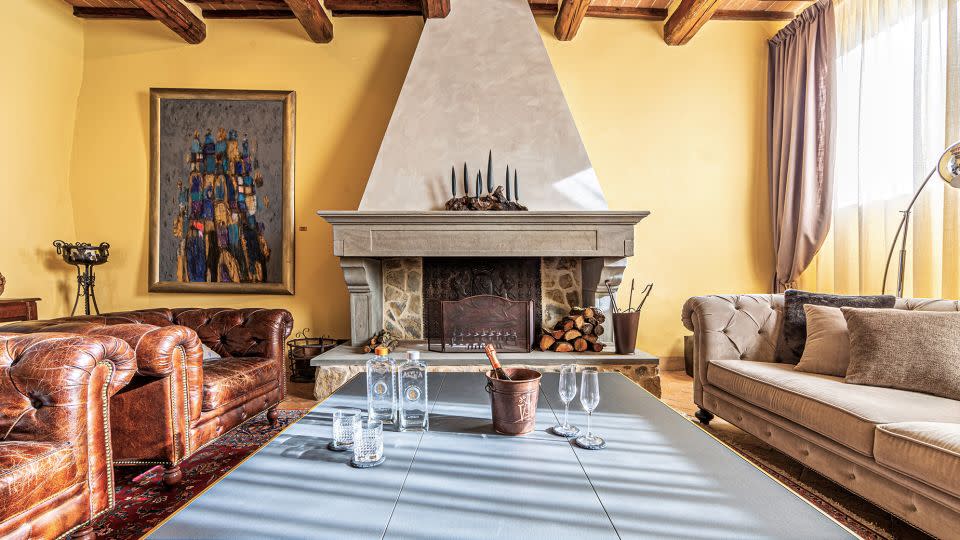
But Lewis and Scali take deep pride in the fact that they never considered securing investors. “Because this was our project, this was our house where we are going to retire, having investors would have complicated that,” Scali explains. “I was so committed to it, I divested a lot of my interest in the firm and used that as seed money.”
The couple hired a prominent architect from Florence, Massimo Pierattelli, to bring their vision — “keep the original Tuscan charm of the place, yet modernize it”— to life, as well as a contractor and crew, Scali said. But they remained firmly hands-on, making sure one of them was on site throughout the process to ensure that everything stayed on track.
Exacting standards
Having renovated three other properties together in Los Angeles, Scali and Lewis were no strangers to the stresses of the task ahead. However, navigating the cultural differences added another unique challenge to the extensive renovation.
The couple quickly learned firsthand the Italian cultural concept of “piano, piano,” which, as Scali explains, means “step by step, and it really, really is the lifestyle. Nobody is rushed to do anything. The only thing that rushes them is pressure, but only if the pressure feels justified.”
Scali and Lewis also had to adjust both their expectations and their “American, particularly Californian, thinking and mindset,” Scali says.
“What’s interesting here is nobody accepts responsibility for anything, and they won’t, and if you try to imply or expressly say how they messed up, which is what you do as a lawyer — like, ‘these are the facts, this is the law, and this is how you broke it,’” he says. “So we came into it with that mindset with our contractor, and he immediately shut down. He was like, ‘You guys are jerks, I don’t want to deal with you.”
At that point, one of their longtime Italian friends, Francesco Goracci, who they eventually decided to bring on as property manager and organizer of guest activities, stepped in as an intermediary to communicate with the contractor, which smoothed things over.
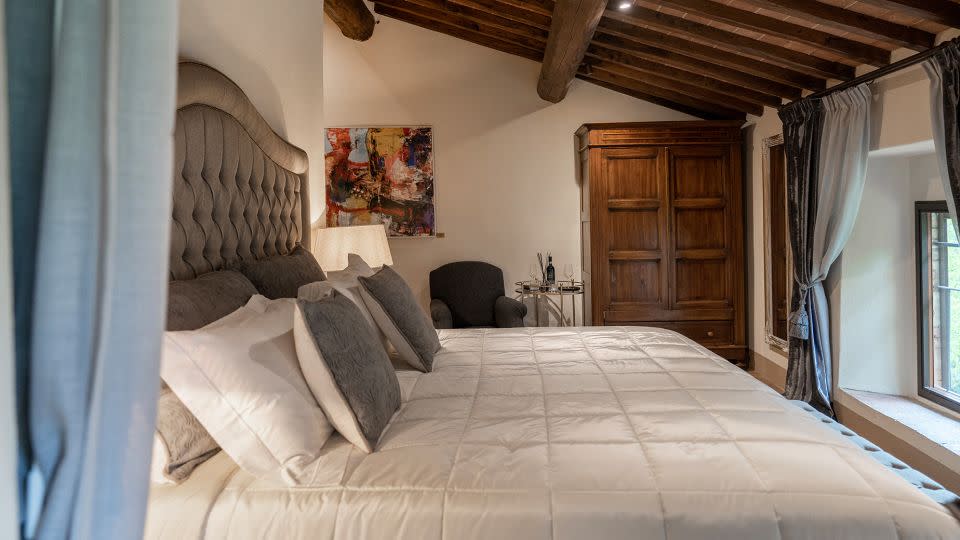
Lewis also notes that there was an initial learning curve for workers around just how exacting their standards were. He recalls one particular example, which now makes him chuckle, when workers dropped and broke a double sink for the bathroom in the office/extra guest suite, and months later installed a replacement sink that had one of the drains in the front, the other in the back.
“And I said ‘no, this is not ok,’ and we had to start this whole process over,” he says. “There were a lot of little things like that, where doors would hit the floor and not open all the way, and we constantly said, “We do not expect our guests to have to deal with struggling to open the door.’”
But by the end of the project about a year and a half later, “the workers were so proud of seeing it come together from what they had done,” Lewis says. “In the end, a light switch might not be totally straight, and I wouldn’t even have to tell them.”
‘We’re living somebody else’s life’
Throughout the process, the couple never strayed from a firm commitment to source as much as they could locally, from the artwork on the walls (which is all for sale), to handcrafted wood furniture right down to light fixtures in the bathrooms.
“If we couldn’t find something, we had it made locally,” Lewis says. “There were only a tiny handful of things we had shipped from the US.”
In addition to preserving the property’s traditional Tuscan design ethos, their commitment to sourcing locally — as well as the fact that both speak Italian — also helped the couple integrate well into the local community.
“There’s a man who owns an art gallery and other businesses in Castellina who was telling me how upsetting it is for people in the local community that there are foreigners throughout Tuscany who have bought places, and metaphorically helicopter in and out, but have no connection to what’s around them,” Lewis explains.
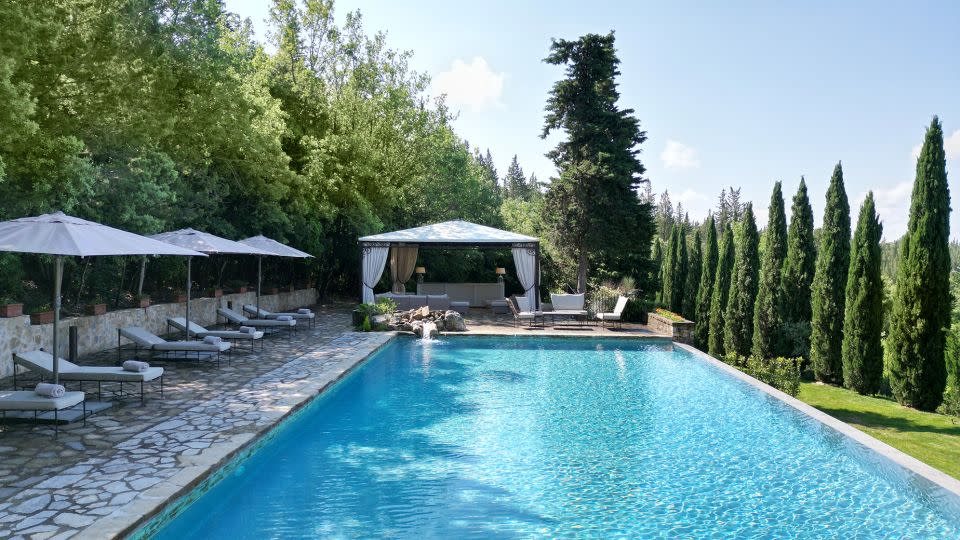
By contrast, the connections he and Scali have made help create an unforgettable experience for their guests, whether it’s a local wine tasting or al fresco lunch in town.
“[Locals] view our guests as our friends or our family, and they treat them that way,” Lewis says. “The degree to which people we made these connections with are so open to our guests has really touched me. It’s also shown me that I’m not just imagining how close we are with them, because they extend that to others.”
To be clear, a stay at Villa Ardore is a bucket-list experience for many. Rates vary but generally start at around $6,900 per night for the entire property, which sleeps up to 18 guests, and go up for custom packages such as cultural and architecture-based trips or “La Dolce Vita,” a painstakingly curated itinerary for hardcore car enthusiasts. It’s also bookable for weddings or small corporate retreats, and Goracci says he can create itineraries and activities suited to guests’ every whim, whether that’s a pizza-making class at the property’s outdoor patio to a driving tour of the Chianti’s rolling hills in a vintage Fiat 500.
Seeing their shared dream come to life is often surreal for Lewis and Scali, both of whom grew up in families that sometimes struggled to make ends meet. “My mother was on food stamps for a while, working a third shift at a factory, [and] Chris’ background is not exactly the same, but similar,” Lewis says. “My life could have been very different.”
He recalls one particular pinch-me moment during the summer while the couple was getting ready for bed one evening after the finishing touches were finally in place and their first guests had just left.
“I was looking around, and I said, ‘We’re living somebody else’s life,’” Lewis says. “We have this wonderful home in L.A., we have this amazing villa in an amazing place, with people around us who love us. How did this happen?”
For more CNN news and newsletters create an account at CNN.com

